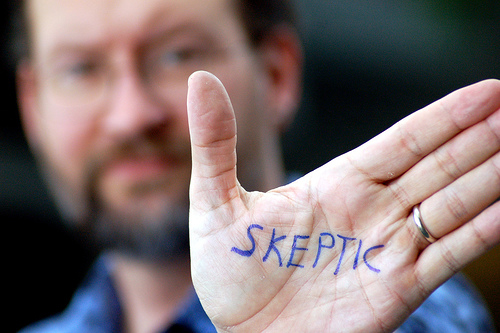A Message to the Twitter Cynics
This note goes out to the scores of individuals who haven’t yet figured out the microblogging platform known as Twitter.
Dear Cynics and Skeptics and Perplexed Ones:
I owe you a big fat apology. And it warrants more than 140 characters.
I’m sorry for failing to give you a clear, compelling (or even coherent) reason why you should give a darn about Twitter.
Despite being an avid, enthusiastic tweeter, when asked to explain the value of the platform, I’ve stumbled. Repeatedly.
Part of my struggle, I think, is that Twitter can serve so many different roles for different people at different times. It’s adaptable enough to morph from an information source, to a research tool, to a real-time search engine, to a virtual hangout with buddies. That’s a huge part of Twitter’s power, but it also contributes to its elusiveness. It’s really challenging to sum up for someone who hasn’t experienced it first-hand.
Unlike Facebook, Twitter requires a longer-term commitment of time and effort before generating any kind of tangible benefit. Many folks just don’t have the patience.
Yet despite what you may think, Twitter is about so much more than posting what I ate for breakfast. No one really cares about that anyway (I barely do).
What it actually is, for me, is a tool for connecting with individuals and organizations in ways that are much richer, quicker and more fruitful than other methods.
In practical terms, Twitter enables me to:
Join communities of like-minded folks. I can share content, ideas and opinions with others who share my interest in architecture, technology, PR, music and other subjects.
Learn more about any conceivable topic. Twitter is a massive resource center of expertise on important issues – from climate change to economic trends to conflicts in the Middle East. And it also provides a wealth of insights on much less weighty issues like the latest celebrity scandals.
Get to the heart of breaking news. Not only does Twitter beat traditional news sources to the punch of major news events, but it also aggregates first-hand accounts from witnesses as well as real-time perspectives of people around the world.
Conduct on-the-fly research. I can pose questions and ask for recommendations or feedback from my followers on any number of topics. Hashtags also enable me to search for all tweets that relate to a specific event, trend or commonly used term.
Monitor companies and topics that matter to me. By using free Twitter management tools such as TweetDeck and Hootsuite, I can collect all tweets that mention a specific word or phrase. This helps me stay on top of who’s sharing what, and when. Because I’m seeing things on a real-time basis, I’m able to share (a.k.a. “retweet”) stuff I appreciate and quickly correct erroneous information or unfounded rumors.
Review lots of content – quickly. I’m able to scan dozens of “headlines” and decide whether to click on any of the accompanying links to articles, blog posts, images and other content.
Discipline my thoughts (and therefore my writing). The 140-character limit, while somewhat random, forces me to distill my posts to their most compelling essence.
Experiment and play around. I can try sharing different types and tones of content to see what resonates most with others. And because I’m a bit of a jokester, I also enjoy sharing funny comments and articles with others who might appreciate them.
So let’s get down to brass tacks…
Have I secured new clients? Yes!
Broken through to mainstream media?Yes!
Made new friends?Yes, Yes, Yes!
Been inspired? Big time!
Any questions?
Sincerely,
Mike
P.S. To get started, here's a terrific Twitter primer.
P.P.S. Feel free to tweet me up at @plot_lines, @SomeChum and @IdeasThatCompel (yes, each serves a different purpose).
P.P.P.S. You won’t discover this on Twitter, but I had waffles for breakfast.


